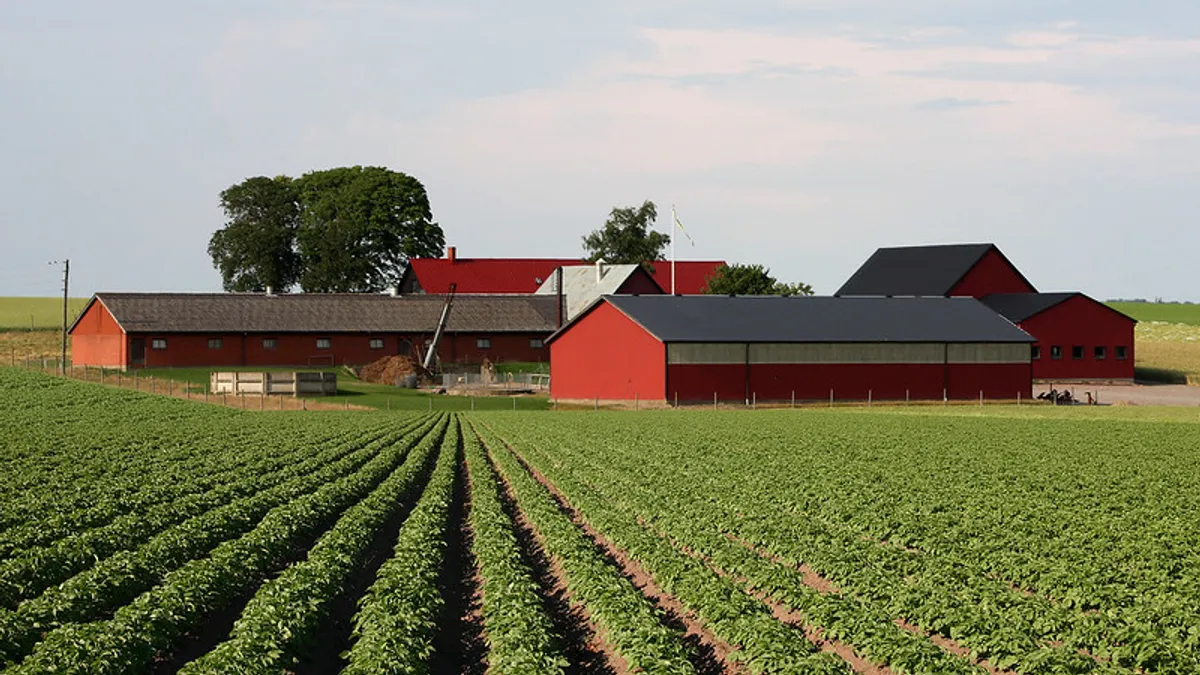Dive Brief:
- The Department of Agriculture announced Monday it will spend $470 million to buy surplus food during the pandemic. The department said this will allow more products to be distributed to communities nationwide while giving financial support to struggling producers.
- The buys will include fruits, vegetables, meat, dairy and seafood, all of which have been negatively impacted by the loss of food service business. The announcement comes after criticism that USDA's efforts have been slow thus far.
- "America’s farmers and ranchers have experienced a dislocated supply chain caused by the Coronavirus," U.S. Secretary of Agriculture Sonny Perdue said in a statement. "USDA is in the unique position to purchase these foods and deliver them to the hungry Americans who need it most."
Dive Insight:
As coronavirus hits the agriculture and food industry, thousands of gallons of milk have been dumped, millions of chickens depopulated, piglets euthanized and vegetables plowed. Despite the increase in consumers stocking up on food during quarantines across the U.S., it hasn't been enough to make up for the loss of food service and closing processing plants as the virus spreads among workers.
By stepping up purchasing efforts, USDA will help alleviate the surplus and provide food to communities that are struggling.
This effort comes after weeks of reports criticizing the government for food that is going to waste in the country. Last month, Politico reported that as food banks were scrambling to meet a surging demand, tens of millions of pounds of American-grown produce was rotting. The USDA reportedly took more than a month to take its first big step to purchase the excess fruits and vegetables. Meanwhile, hog farmers have warned of an impending financial crisis as they have no where to bring their market-weight pigs.
Tyson President Dean Banks said this week that the company's pork processing capacity is at roughly 50% of normal with four facilities closed and more operating below max capacity due to worker shortages. The company expects meat supply to increase in the third and fourth quarter of 2020.
In April, the USDA announced a $19 billion relief package for the agriculture industry to help food producers who have experienced "unprecedented losses," with $16 billion going toward direct payments to farmers and $3 billion to buy fresh food to give to the country's food banks. The USDA’s Agricultural Marketing Service said it would procure about $100 million per month in fresh fruits and vegetables, $100 million per month in dairy products and $100 million per month in meat products to provide a pre-approved box of products to food banks and other non-profits. Although the industry praised the relief, many criticized it for not being enough.
Now the USDA is giving another round of funding toward the surpluses "during these unprecedented times." A big part of this latest funding will go toward the dairy industry, which has been hit hard by the pandemic. About $120 million will go toward dairy, potatoes and turkey products will be bought for $50 million each and strawberries will get $35 million. Chicken, pork, raisins, prunes, catfish, pears, tart cherries, Alaska pollock, asparagus, sweet potatoes and orange juice will also get purchased in the buyout. Many trade groups are already applauding the additional funding, but still asking for more help down the line.
The National Potato Council said in a statement this is a positive step in a long road to recovery, but the industry still needs more help from Congress and the administration.
"Given the size of the crisis involving potatoes, this purchase is a partial down payment on the industry’s overall relief needs and more will be needed," Britt Raybould, NPC's president, said. "In the short term, the announcement is very positive in that it provides clarity on the immediate relief efforts and gives family farms hope for more to come."
Different sectors across the industry have urged the department to purchase more food for weeks. Last month, the National Pork Producers Council asked for more than $1 billion in pork purchases to clear out a backed-up meat supply and in March, U.S. seafood companies wrote a letter to the Trump administration asking the government to buy at least $500 million in surplus commercial seafood.
Although this additional surplus purchase could help some farmers and producers stay afloat and stop dumping food, industries will likely continue to advocate for more support as the pandemic drags on.
















